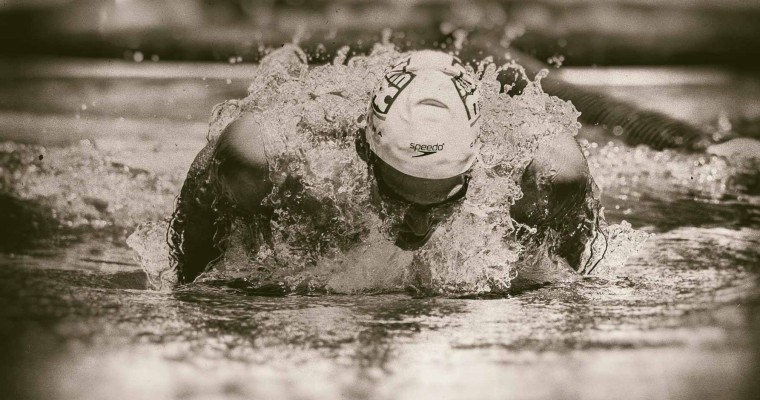Thanks to former Michigan swimmers Emily Brunemann and Kally Fayhee for sharing this story, the next installment in an ongoing series on mental health. You can read the first piece here.
Close your eyes and picture this scenario:
You are walking down the street and you see someone with a broken leg, on crutches, trying to enter a building. There is a visible struggle as they try to balance on one leg while opening an impossibly heavy door. They may not ask for help, but you can see the struggle. What would you do? Would you hold the door open and help them walk through?
When it comes to mental illness, it can be difficult to help someone struggling when there is no visible injury. Many times, those suffering hide their mental illness, anxieties or struggles, not because they aren’t yearning for help, but because it is an isolating struggle. When there is no visible wound, how do we identify those who are struggling in order to open up the door to recovery?
We must become proactive instead of reactive in encouraging help seeking.
Proactive Vs. Reactive:
Tips on how to proactively identify those who may be struggling.
Tip 1: Trust Your Gut, Reach Out and Express Concern
If you see changes in a friend, child or athlete, reach out. Changes in mood can be attributed to many factors. Regardless of the cause, it never hurts to start the conversation. It is always important to remember that a person does not have to be struggling with a diagnosed illness to reach out or get help from friends, family or coaches. Reaching out to express concern allows you to proactively start the dialogue to promote mental health.
Tip 2: Take Notice of Small but Habitual Changes
We are human; we will all have bad days and occasionally struggle. When those bad days become a stretch of bad days or you see continual changes in a friend, athletes or child’s mood, reach out. See below for a few signs to look for:
- Feeling hopeless
- Change is sleeping behavior (lack of sleep or over sleeping)
- Isolation
- Loss of interest in activities that were pleasurable in the past
- Impulsive, risky or hedonistic behavior
- Irritability or irregular irritation
- Loss of appetite or overeating
- Difficulty remembering details, making decisions or concentrating
Tip 3: Have An Open Door Policy and “Judgment Free Zone”
Fostering an environment where conversations are judgment free and honest is an important component to helping those who are struggling. It is often hard to remove the stigma surrounding asking for help because those struggling often believe it is a weakness to ask for help. It is not a weakness to receive help and by letting those around you know the door is always open, you begin to establish a safe space to talk through struggles.
When you first reach out to someone you believe is struggling, there may not always be a positive response. They may want to continue to open that heavy door on their own. No matter what you are met with on the other end, knowing you support them, in a judgment free way, is the best way to create a safe environment. Persistence is key, so keep asking and keep supporting. Knowing you are there as a support system will make it easier to reach out when they are ready.
It may take time for those struggling to reach out. Keep opening the door for others, even when they don’t ask for help or seem as if they don’t need it. Knowing that someone is there and will continue to be there is the best way to foster honest conversations around the mental health struggles.
About the Authors:
Kally Fayhee is a former swimmer and team captain for the University of Michigan (’09 – ’13). She currently lives in Chicago, working for a global advertising agency, Leo Burnett. Kally is a member of Athletes Connected, a program at the University of Michigan that aims to increase awareness of mental health issues, reduce the stigma of help seeking and promote positive coping skills among student-athletes (http://athletesconnected.
Emily Brunemann is a professional swimmer, currently training with hopes of making the 2016 Olympic Team in the 10k. She graduated with a B.A. in Psychology from the University of Michigan in 2009 and is currently working on her Master’s degree in Social Work, with a concentration in interpersonal practice and mental health. Emily is interning in the University of Michigan Athletic Department counseling services and helping with the Athletes Connected program. She is a former team captain, NCAA champion, 2013 Open Water World Cup Circuit Champion and a member of the US National Team since 2007.

Thank you SwimSwam and Kally and Emily for sharing these important messages. Ending the stigma around mental health issues is long overdue. We need to shout this message out far and wide among the swimming community. Wouldn’t it be great if USA Swimming were to support programs among all club teams centered around education and awareness? What can we do to make that happen? Thank you again.
Tapering exercise to regain mental health and then adding exercise back in is a topic that needs to be seriously considered for any athlete feeling overwhelmed.
Thank you for this organized, accurate, and well-written article. The timing is good not just within the swimming community, but for the country as a whole. Movements to recognize depression signs and stop the mental illness stigma everywhere from athletes to scholars to veterans of war are really picking up steam and that is a good thing. Rest in peace to all of those who have passed away from mental illness, and know that we are making progress.